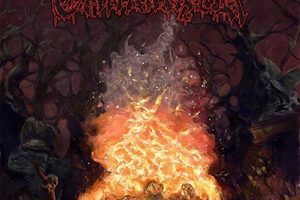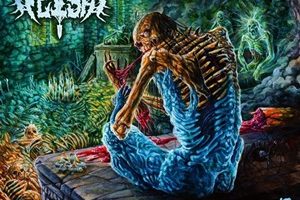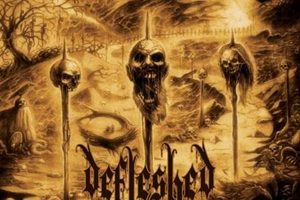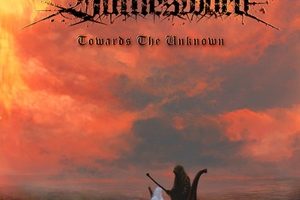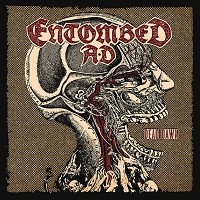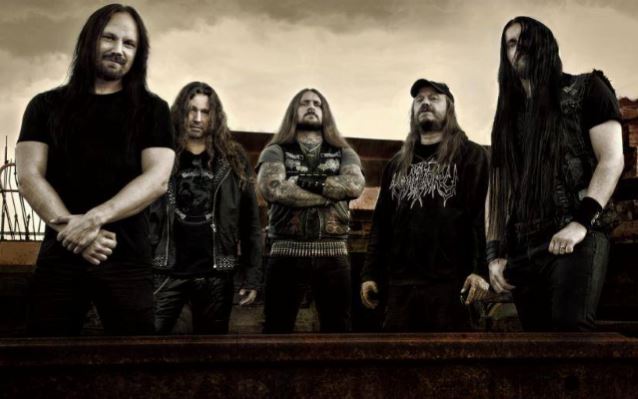Entombed – A Clandestine Path
Sunday, 12th May 2019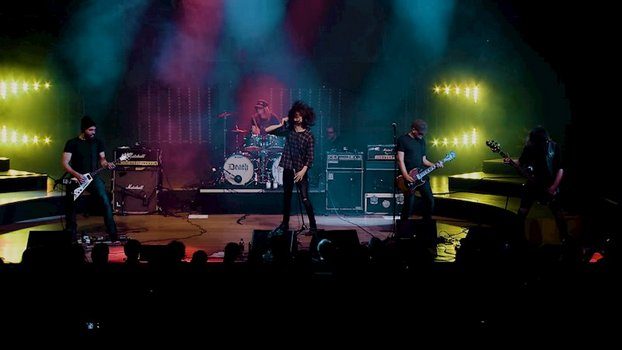
When it comes to the seminal names in death metal that new bands often cite as an influence, it’s hard to top that of Entombed. One of the acts that defined the Swedish death metal movement with their debut Left Hand Path and follow-up Clandestine, they also continued to evolve and shift with each album, going into things like death ‘n roll (Wolverine Blues) and beyond. They also have come up with some unique presentations for their material, as witnessed with Unreal Estate’s ballet, which brings us to the present. The band recorded Clandestine and played it live in two formats, one of which was done with a full orchestra and choir. To discuss this offering’s release, we chatted with guitarist Alex Hellid and got a retrospective look at all things Entombed.
Dead Rhetoric: I know this was filmed back in 2016, but with all of the anniversary live shows nowadays, did you see using an orchestra as a way to shake things up a little bit?
Alex Hellid: Yeah, definitely. The opportunity came along, and I had been thinking about it for a long time. As early as 2005, someone suggested, or sent us a letter – a written, old school letter on paper – out of the blue asking us about doing something with an orchestra. He suggested that Clandestine would be the perfect album to do it with. So I’ve had that in the back of my mind ever since. Another fan from Hamburg was in the philharmonic orchestra and he sent us an orchestration that he had done of “Chief Rebel Angel” and something else. That was another seed. In 2010 or 2011, I had no idea how to work with an orchestra and try the idea out, but someone asked us. So it was really easy to just say yes. I was looking forward to the opportunity, because as you said, it was something different.
We have been doing this for so long – in 2002 we did a different crazy thing like that. Someone had approached us about doing music for a ballet [Unreal Estate] in Stockholm. That experience was really cool because it was doing something else – like entering into another world. Out of that you always learn something. So this was a great opportunity and exactly the right thing to do at the time. I was also at a place where I was thinking about where we could go to not repeat what we had done before.
Somewhere in the back of my mind I also had a wish to involve Uffe [Cederlund] and Nicke [Andersson] as well. They hadn’t been in the band for a long time, and doing Clandestine was a good way to get them involved again. There was no way we could do it properly without them. Uffe helped out a lot when we sat down with the guy who arranged the orchestrations. We sat down and went through every song and every riff so he would know the parts we had for each song so he would know what was going on with each track. So it was also a great opportunity to get back with the original guys and I’m really happy about that actually.
Dead Rhetoric: You said someone out of the blue mentioned it, but was there any other reason why it was Clandestine, outside of it being the 25th anniversary when it was recorded? Was there something that helped it in terms of being orchestrated?
Hellid: The idea really came from that guy sending us a letter. I have no idea who it is actually. But I liked the idea of instead of having to think about what songs [from each album] we were going to do if we worked with an orchestra, I felt it was really easy to do an album from start to finish. Another big reason for me was that there is so much going on in [Clandestine] that some people have probably never heard. I thought it was great to show people a bit more of what this album really is.
When we started working on this, because it’s been a long process – we probably never could have planned for it to be played on it’s 25th anniversary of release. That was just some sort of coincidence. When we started it could have been the 15th or 20th, and it ended up being the 25th. The fact that it was done and recorded on the same night that the original album was released in 1991 was just pure luck [laughs]. It was just one of those things where the planets line up and it’s meant to be.
Dead Rhetoric: What did you like best about hearing Clandestine with an orchestra and choir?
Hellid: I loved the fact that it came back sounding like a movie score. We did do a version of Hellraiser [by Christopher Young] back in like 1993, and it was really cool to hear it that way. I wanted to see the movie right away. Now that’s in the back of my mind – how can we make a movie out of this? We have the soundtrack and the artwork. How can we get a story out of this? I don’t know if it is going to happen, but it’s something I’d like to think about some more and maybe I can make that happen too.
Dead Rhetoric: That’s an interesting idea – taking what you have done and extending it farther.
Hellid: Usually it’s the other way around. Someone comes up with a title or an idea for a movie and then the music is the last thing, but we can just turn it around and start from the other end and write a story to it. That would be interesting. It’s a long project that would probably take another 10 years or so, but it’s fun to have these little things to tinker with on the side.
Dead Rhetoric: You did the ballet a while back, and you did the orchestration for Clandestine. Any other Entombed albums you’d consider doing a different presentation for?
Hellid: There’s so much work to go into it, but definitely if we get a chance. We would like to take this orchestra piece out of Sweden. That’s one thing we are working on. In doing that, it’s kind of a work in progress. We have done three of them. The first two were just orchestra, the first one a smaller orchestra with no choir and then the second one added the choir with a slightly bigger orchestra. The third one, which was recorded, was a full symphonic orchestra and what we are talking about now is adding other art forms to it as well. Maybe get more visuals or something. It will be interesting to see where we can take this, and hopefully we can get it outside of Sweden as well.
Maybe we could do the band version – perhaps not at the same venue. That was one thing we didn’t really think about. The venue was for a seated audience, which worked very well for the orchestra, but it was really odd to watch the band footage – we move around on stage but the audience looks like they are frozen. People are sitting in their seats trying to headbang. But it was a new experience. We never played a full set to a seated crowd before.
Dead Rhetoric: It must have been strange to be playing an album like that and having people in their seats – it must have felt like a bit of a disconnect.
Hellid: In the warm-up show we did two weeks earlier, it was the opposite. It was on a cruise ship late at night. People had been drinking all day. That was like mayhem compared to this show [laughs]. But the circumstances of the venue always adds something to the performance. It ended up being a cool show, even if it was very different from what we are used to.
Dead Rhetoric: To go way back, what do you recall about the days of writing and recording Clandestine?
Hellid: I was like 15 years old. It feels almost like another life, but also like it was yesterday. Those first three albums, at least the first two – we started the band in 1986-1987 and we did four or five demo tapes in 1987-88, and we recorded the first album in 1989. It came out in 1990 and it felt like there was a lot happening in a short period of time. At the time, it felt like it was a long time, but when you look back at it, you look back and it’s like, “Did we really do all of this in that amount of time?” Nowadays it takes 10 years to get this live album out! We recorded it in 2016 and now it’s 2019. It’s not like I haven’t been working on it, but things take time. Things were happening a lot quicker then for sure.
I remember it as a really happy time. It was a time before business problems, and issues with touring, and those sort of things. That stuff that slows you down as a recording entity. After the third album, we got into the whole thing where we were going to leave the record company and that took over a year with that nonsense. I remember that period as being like 10 years long because it was so boring. I was dealing with a lot of waiting around – Uffe and Nicke actually had some other projects going on but I was the one dealing with talking with management and lawyers – it was frustrating. Before that, things were moving along and we were recording and doing shows. Then all of a sudden, things slowed way down after the third album.
Since then, it has been hard to find that role that you had as a kid [as an adult]. Things seem to take a lot longer. But I spoke to Uffe and Nicke today and we are hoping to get everything ready to go to record some new stuff. Hopefully we can avoid getting into any delays with that. We just want to go and record, and start releasing stuff. Not wait until we can set aside a few weeks and go and record a full-album. We have a few songs ready to go, so lets go and record them and maybe release a 12” single or something. Just do what we did at the beginning and not worry too much about things being perfect before we go it. At that rate now, it would take forever!
Dead Rhetoric: The band went in a number of directions over the years. What do you see as the evolution that Entombed had?
Hellid: For us, it was a natural thing. We never really decided to start a band and do a particular type of music. Every album sounded the way it did because that is where we were at that time. The first album sounded the way it did because that’s where we were at the time. If it had been recorded earlier, it probably would have sounded more hardcore-y. We all grew up with classic hard rock, heavy metal, and punk, but we were getting into the skate scene – the NY hardcore scene and Suicidal Tendencies. Everything that was related to skate culture back then. On Left Hand Path, there were still a few things left on there that you can hear, like The Stupids and little hardcore riffs that aren’t totally metal.
Then the second album sounded the way it did due to meeting Atheist. We did a show in Sweden with them and Candlemass. We were blown away by their set, and it was so technical. That is what took us in a more technical direction for Clandestine. As we remember it, people were really confused by the second album, as they thought we were going in this more progressive metal direction. Today people probably don’t think too much of it, but then people asked what happened – it wasn’t Left Hand Path. They didn’t know what was going on. Then of course, Wolverine Blues came out and it was like, what happened now? It was confusing for people for a while, but I think they got used to us sounding different from album to album. That’s part of what Entombed is.
It’s going to be interesting going forward. We’ve discussed a little bit about being on the same page with what we think the new stuff should be like, and we all agree that we should not try and go back and copy anything directly. But we should take the parts that we like from the first four albums and try and add something new to that. It should be really interesting. Since each album sounds different, you also have the people that may have discovered the band on the third or fourth album, or even the fifth one. We can’t really take for granted that if we did a straight Left Hand Path death metal record. It might make a few people happy but it isn’t going to make everyone happy. That’s hard to do anyway, but if we can try to do with the live setting. You can’t play a full album but you try to pick songs and put them together so that there is a dynamic that fits. It doesn’t matter if its from an earlier or later album, you just try to make it sound good. Hopefully that is what we will achieve.
We also want to do something that we talked about in the past in recording the first couple of albums – try different things that we didn’t have time for. When go into record an album, you have to make sure that you get it all done and don’t spend too much time on each song. Tomas Skogsberg, whom we recorded with, is a big Beatles fan and suggested that maybe we do one song at a time, finish it and spend the time needed on one track and then go onto the next one. That’s what we are going to try this time around. For one, because we haven’t tried it before, and because it makes it possible for us to start recording without having say, 12 songs completed. I like the approach, since you can focus on one thing at a time.
Pages: 1 2











